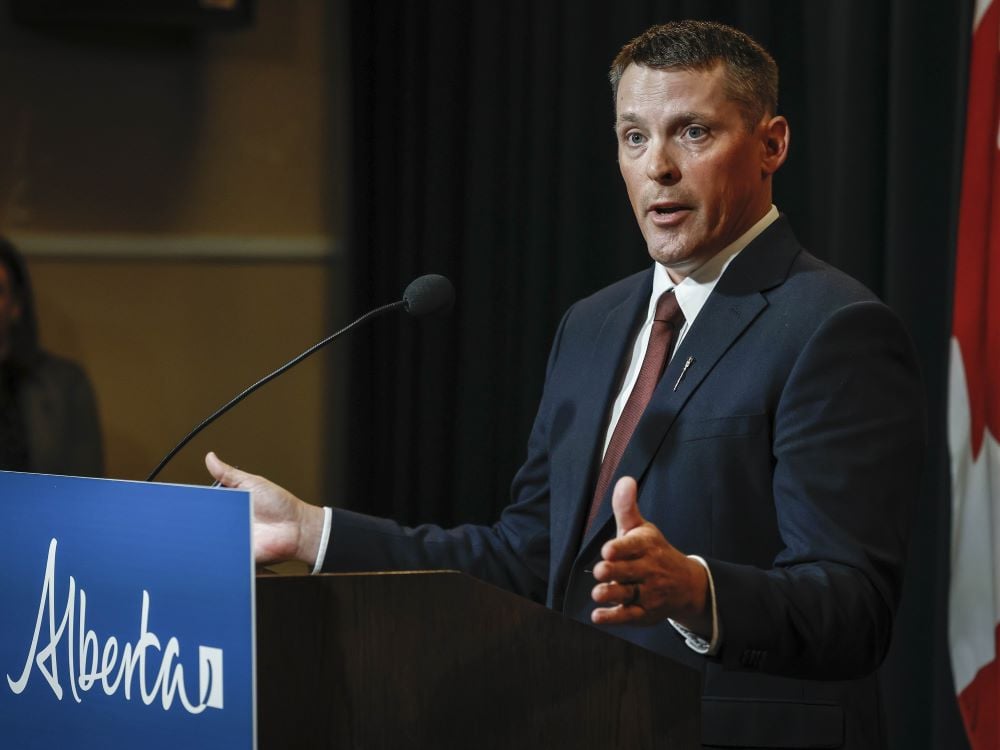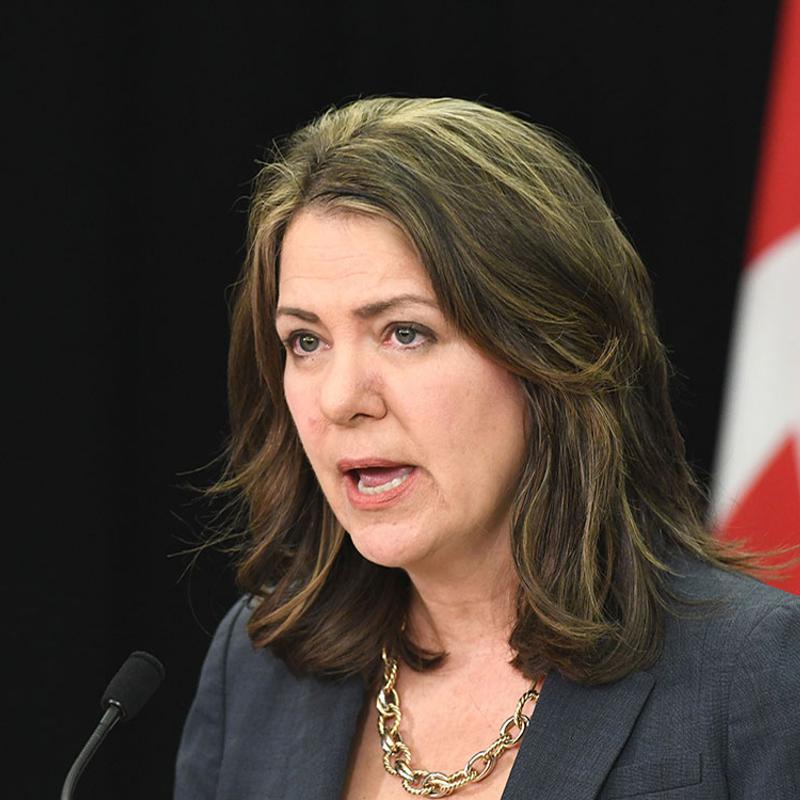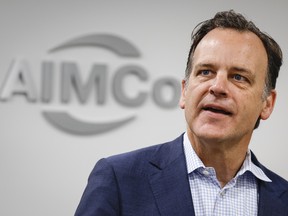Author of the article:
Published Nov 08, 2024

The mass overhaul of leadership at the Alberta Investment Management Corp. will likely raise new questions about the provincial government’s proposal to implement an Alberta pension plan which, if approved by Albertans and the province, would likely be managed by the Crown investment corporation.
Article content
The Alberta government on Thursday dismissed the $169-billion public pension fund’s 11-person board, its CEO and three executives, citing frustration with increasingly high costs and AIMCo’s over-reliance on third-party money managers. On Friday it appointed Ray Gilmour, a longtime government bureaucrat, as interim CEO.
The province’s extraordinary intervention into the arms-length pension fund manager resurrected questions around potential plans to put a provincial pension to a referendum — an idea that has gone dormant after receiving wide disapproval in late 2023. Finance Minister Nate Horner said Friday the upheaval at AIMCo has “nothing to do” with it being the potential manager.
“This move surely does not come across as something that creates a lot of confidence in the Alberta government. If anything, this is just another nail in the coffin if that’s what they’re trying to do — I don’t know. It’s all very strange,” Keith Ambachtsheer, director emeritus of the International Centre for Pension Management at the University of Toronto’s Rotman School of Management, said of the potential Alberta Pension Plan.
Article content
AIMCo, the sixth-largest pension fund in Canada, is responsible for overseeing the nearly $24 billion Alberta Heritage Savings Trust Fund and has a mandate to operate independently from the government — though the law defining its mandate allows for greater government involvement than is available to the federal government in relation to the Canada Pension Plan Investment Board. The now-dismissed board members were all appointed by the governments of former premier Jason Kenney and current Premier Danielle Smith.
Keeping assets in the Canada Pension Plan Investment Board — the least-expensive option available — was also considered in the report, however that option presents serious challenges because it would require approval from several provincial governments.
The Lifeworks report suggested amending legislation to assert AIMCo’s operational independence in the event it became responsible for an Alberta Pension Plan’s assets.
Confidence in AIMCo at risk, expert says
The province’s offensive on the issue came to a halt late in 2023, as Premier Smith has said the province needs an agreed-upon estimate on Alberta’s entitlement before forging ahead.
“(The Alberta Pension Plan) has completely dropped off the political agenda,” said Duane Bratt, a political science professor at Mount Royal University. “Now it’s going to go right back on the agenda.”
Thursday’s decision will undermine confidence in AIMCo over the short-term and thus its ability to manage an in-province pension plan, Bratt said, but public sentiment could change over the long run if the corporation stabilizes.
“Maybe they think by the time that they put this to a referendum, let’s say in a year’s time, maybe AIMCo’s ship will have righted itself because of the actions that were taken … I don’t know. But AIMCo is connected to the APP,” Bratt said.
Ambachtsheer said he’s perplexed by the overhaul, adding the government has left numerous questions unanswered.
“To suddenly dismiss all these people, I can’t explain it,” he said. “The current reasons just don’t hold water, they’re just not credible.”
Alberta NDP Leader Naheed Nenshi said the mass dismissals “leads to a real drop in public confidence in the work they’re doing.
“This action should mean that any talk of the vastly unpopular Alberta pension plan should be dead now. It should be done, because it’s very clear that the government has admitted that they have no idea how to manage people’s pensions,” Nenshi said in an interview.
Nenshi said the issues at AIMCo, as outlined by the province, do not come as a surprise, but he takes issue with the government’s approach to making changes at the corporation. “We’ve known all this is going on for some time, so how did the government take its eye off the ball so much that they have to take this kind of drastic action instead of managing the process as any normal, sane shareholder would do?”
Money manager’s interim CEO a longtime public servant
AIMCo’s interim CEO, Gilmour, was touted as a dedicated public servant. He has commissioner of corporate services for the City of Medicine Hat and has a background in the banking and financial services industry, according to a profile on the C.D. Howe Institute’s website. (Horner will serve as director and chair of AIMCo for the next month until a new chair is appointed.)
Gilmour has served in executive councils under ex-premiers Rachel Notley and Kenney, and currently under Smith, spanning several ministries including finance, intergovernmental relations, infrastructure and municipal affairs.
Horner’s office declined an interview request on Friday.
Meanwhile, Alberta’s lieutenant governor also approved on Thursday the incorporation of a provincial corporation “for the purpose of managing and investing all or a portion of Crown assets.”
This move is not related to the government’s decision to axe AIMCo’s board and CEO, Justin Brattinga, press secretary for Horner, wrote in an email to Postmedia.
“The corporation is a preliminary step in our work to grow the Heritage Savings Trust Fund, and as Minister Horner said we will have more to say on that before the end of the year,” Brattinga wrote. “The establishment of the corporation is not related to the actions taken in regards to AIMCo.”
Article content
Teachers’ Retirement Fund says pensions ‘remain secure’
The Alberta Teachers’ Retirement Fund on Friday told members in a statement that “their pensions remain secure” and that nothing at AIMCo to date has concerned it about the status of its investments — though it has raised issued with regards to costs at AIMCo with the investment manager and the province.
“We look forward to working with Treasury Board and Finance and being part of determining the appropriate path forward,” it wrote
The Alberta Federation of Labour said Albertans “deserve answers” on the government’s decision.
“Precipitous actions like this do not inspire confidence that the UCP can be trusted with the retirement savings of hundreds of thousands of Albertans, or that they can be trusted to successfully and safely run an Alberta-only alternative to the CPP,” wrote Gil McGowan, AFL president and former Alberta NDP leadership hopeful.
In Ottawa, federal NDP MP Heather McPherson called the move “another step to pull Alberta out of the Canada Pension Plan” while federal Minister of Labour and Seniors Steve MacKinnon called the province’s moves “harebrained schemes coming out of Alberta” and said the CPP has a “sterling” reputation.
— With files from Matthew Black
UCP Fires Board and Top Executives Managing Public Pensions
Shock announcement raises questions about what Danielle Smith plans for workers’ retirement savings.

With its surprise decision to cashier the entire board and the top executive of the supposedly independent Alberta Investment Management Corp., we see once again that the United Conservative Party government is determined to control everything, everywhere, all at once.
And if you’re an Albertan, that includes your retirement savings in the Canada Pension Plan Investment Fund.
Indeed, we can be certain this shocking announcement has something to do with that scheme, because chronic underperformance by AIMCo, as the provincial Crown investment corporation is commonly known, has been a frequent target of critics of the UCP’s planned pension grab.
Under the headline “Restoring confidence in AIMCo,” the government said in a terse and unexpected news release Thursday that “after years of AIMCo consistently failing to meet its mandated benchmark returns, the minister of finance will be making changes to restore confidence in Alberta’s investment agency.”
But why now?
The Tyee is supported by readers like you Join us and grow independent media in Canada
The release complained about a 96-per-cent increase in management fees at AIMCo between 2019 and 2023 and a 29-per-cent increase in the number of employees while the Crown corporation managed a smaller percentage of funds internally — although the news release made no effort to explain exactly what that last point meant.
“Alberta’s government has decided to reset the investment corporation’s focus,” the news release said mildly. “All board appointments have been rescinded and a new board will be established after a permanent chair is named.” That, according to the release, is supposed to take place within 30 days.
“In the interim, president of treasury board and Minister of Finance Nate Horner has been appointed the sole director and chair for AIMCo, effective immediately” — which is not really reassuring for a supposedly arm’s length company managing $169 billion in pension investments.
Notwithstanding the 30-day promise, a cabinet order set Horner’s term as chair of the AIMCo Board to run until the end of September 2025.
Accusing the UCP of wanting to control everything, everywhere, all at once was a clever tribute to the 2022 comedy-drama movie of the same name first used by NDP justice critic Irfan Sabir last spring to describe the UCP fiddling with its own fixed election date law to give itself a little extra time in office.
“Danielle Smith said during the election that Albertans were her bosses,” added Rachel Notley, who was leader of the Opposition at the time, “but it is clear now that she intends to be the boss of everyone.”
Those lines could certainly be applied with similar effect to Thursday’s bombshell.
A comprehensive article in the Globe and Mail revealed that in addition to the 10 board members referred to but not named in the news release, CEO Evan Siddall and three other unnamed executives had been canned.
Siddall, who was appointed CEO on July 1, 2021, with a mandate to turn the company around after its big trading losses during the pandemic, had been the long-time president and CEO of the Canada Mortgage and Housing Corp. Judging from his Wikipedia biography he seems to have attended meetings of the World Economic Forum and the Bilderberg Group, which must have made certain MAGA-minded members of the UCP caucus feel as if they had ants in their pants.
Or maybe it was Siddall’s decision to let Alberta’s teachers have a limited role in the management of their pension fund, which had been grabbed by the UCP in 2019 and handed over to AIMCo amid great controversy. Indeed, some of those additional pension employees the government was complaining about likely came from the management arm of the teachers’ pension fund.
Whatever happened, NDP finance critic Court Ellingson told the Globe that Siddall and some of his colleagues showed up at a public meeting of the standing committee on the Alberta Heritage Savings Trust Fund on Wednesday and there was no hint anything was afoot.
Ellingson said in a statement sent to media Thursday afternoon that firing the entire board and the CEO is too drastic a measure for this just to be about AIMCo salaries “when this government passed legislation to remove the caps on salaries for board members.”
“The premier herself appointed some of these AIMCo directors,” he said. “The finance minister himself said this spring that AIMCo was doing a good job.”
He also argued that even in a temporary role, having a partisan politician at the helm of a supposedly arm’s length agency investing 375,000 Albertans’ retirement savings is troubling.
It certainly seems to have unsettled some in investment circles. The Globe quoted the director emeritus of the International Centre for Pension Management at the University of Toronto’s Rotman School of Management, Keith Ambachtsheer, saying the move “should be construed as a government takeover of [an] asset pool that belongs to the people of Alberta.”

Will Danielle Smith Use Albertans’ Pensions to Bail Out Big Oil?read more
Ellingson argued “AIMCo’s poor returns are a clear reflection of the UCP’s incompetence.”
“We have raised concerns about their poor returns for years, and we’ve noted AIMCo’s returns have been below that of the Canada Pension Plan,” he said. “Until now, the UCP even proposed using AIMCo to manage the proposed Alberta Pension Plan. Any such APP scheme should now be completely off the table.”
Count on it, though, the opposite is true. If this indicates anything, it’s that the UCP still covets the CPP’s investment funds and saw AIMCo’s returns as an impediment to that ambition. Nor does the party value independent minds in positions of oversight.
Interestingly, another Order in Council published Thursday “approves the incorporation of a provincial corporation for the purpose of managing and investing all or a portion of Crown assets.”


After changes at AIMCo, United Conservatives now own successes and failures of fund giant
Ousting board and CEO a blow to agency's independence: top pension fund analyst

When Alberta's public pension manager lost $2.1 billion in a risky bet on market volatility in 2020, little of the scorn or blame fell at the feet of then-premier Jason Kenney or his government.
Why? The investment decisions at the Alberta Investment Management Corporation (AIMCo) are independent of the government. Cabinet's lone role is to appoint directors to the fund manager's board and let the experts invest, trade and (ideally) grow the funds.
The teachers group whose pension funds the Kenney government transferred to AIMCo's control was understandably frustrated their savings' destiny was tied to the downs and ups of the wealth giant in that moment, but the teachers' union wasn't lobbing rhetorical grenades at the premier for the loss itself.
That distance between the politicians and the pension investors shrank substantially this week, when Finance Minister Nate Horner took the unprecedented step to remove the entire independent board of AIMCo, name himself the temporary one-man board and fire CEO Evan Siddall.
All future rhetorical grenades (and bouquets) can be addressed to the finance minister and Premier Danielle Smith.
Ready, AIMCo, fired
Horner has pledged to appoint a new board within a month, but in the meantime he appointed as interim CEO Ray Gilmour, a veteran senior provincial bureaucrat who lacks experience in the world of big-fund management, but did work in Alberta banks more than two decades ago.
The Smith government pitched the move as "restoring confidence in AIMCo" after underperforming financial results and rising costs. Sebastien Betermier, a leading analyst of pension funds, doesn't see this as confidence-building in the agency's ability to make the sophisticated, long-term investment decisions they need to.
"To me it goes the exact opposite way," Betermier, the executive director of the International Centre for Pension Management, told CBC News. "That goes against the whole independence, the ability of the funds to work at an arm's length from government."
When the province created AIMCo in 2007, the then-Tory government specifically barred MLAs from serving on the fund manager's board, to ensure independence. A cabinet order this week temporarily undid that rule.
Betermier, a finance professor at McGill University, said this seemingly abrupt turmoil could also give pause to other major investors or firms AIMCo partners with on large-scale investments. The fund currently co-owns Yorkdale Mall in Toronto with a major property developer (itself owned by an Ontario pension manager), and has been building thousands of U.K. rental apartments in a joint venture with a British firm.
"When you see moves like this, where the government can come in any day and dismiss the whole board, that sends shivers in your ability to implement such projects going forward," Betermier said.
Horner expressed some disappointment in recent failures by AIMCo to meet growth benchmarks, but said cost growth was the main reason behind the move. In announcing the board's sacking, his office noted that over the last four years, AIMCo has hiked its staff expenses by 71 per cent and its employee numbers by 29 per cent.
"We want them to be a low-cost provider," Horner told reporters.
Unmentioned in that news release is that, thanks in part to the shift of teachers' pension funds to AIMCo's portfolio, the agency's total managed assets rose over that stretch to $166 billion from $115 billion, a 44 per cent increase. (Instead, the release noted that more funds are being managed by external groups than previously.)
Does an investment firm guarantee itself better returns by slashing its workforce and hiring lower-paid executives?
Short-term frustration with costs can overlook the time it takes to develop an international investment strategy over a longer term, Betermier said.
Of the country's major public-sector pension managers known as the Maple 8 — including the Canadian Pension Plan Investment Board and the independent investment arms of the British Columbia and Quebec governments — it's the youngest, only launching in 2008.
It's lately been playing catch-up to its peers to establish more international offices, including New York this year, its first Asian office in Singapore last year, and a recent plan by Siddall to more than double its presence in London.
"It's a project where you can generate a lot of value for pensioners, but you need to give it time," said Betermier. "One of the big risk factors is precisely government interference, when you come right in the middle of an initiative and you undo it."
Horner isn't alone in his frustration with the costs. Deb Gerow, president of the Alberta Retired Teachers Association, said expenses and management fees "have been a concern for us," compared to the educator retirement fund's smaller previous operations.
But is the wholesale sacking of a board the solution to a minister's balance-sheet frustrations?
"It struck me as a rather extreme reaction given the problems the government identified," said Bob Baldwin, a veteran pension consultant who has chaired the C.D. Howe Institute's pension policy council.
It makes him wonder what other considerations were behind the Smith government's takeover of AIMCo leadership.
Horner and his office have said this decision has nothing to do with the UCP's consideration of removing Alberta from the Canadian Pension Plan (and possibly putting AIMCo in charge of an Alberta pension mega-fund). Nor, they say, does this have anything to do with the premier's ambition, reiterated at last weekend's UCP convention, to balloon the $23-billion Heritage Savings Trust Fund into a $250-billion fund by mid-century.
There is certainly a desire by Horner and the premier to change the focus and approach of the Crown corporation that currently stewards Alberta's long-term savings account and the retirement funds of thousands of residents. It's not clear how they want that approach to change, aside from producing wealth management on a leaner budget.
And what happens to AIMCo's investments in the coming years will depend on the quality of the leaders Smith's cabinet selects to run the agency, who will undoubtedly be more aligned with the desired directions of Horner and the premier than a group appointed over several years by both UCP and NDP premiers.
Success will be attributed to this government's actions. So will future losses and failures.
It's the same way that the Smith government has tied Alberta Health Services' outcomes to their own decisions, by ousting the entire board in 2022 and then redesigning the entire system's structure.
They dismantled and remade it, and will politically own whatever comes next.
AIMCo expansion, Alberta's investment
focus were sources of tension before purge,
sources say
Pension veterans say there was more going on behind the scenes than scrutiny of costs
Author of the article:
Published Nov 08, 2024 •

The decision by Alberta Investment Management Corp. (AIMCo) to launch operations abroad as it chased higher returns and the extent to which the investment manager should invest in Alberta were sources of tension with the provincial government in the months leading up to Alberta’s stunning decision this week to remove AIMCo’s entire board of directors and chief executive, according to several people familiar with what transpired.
In a news release Thursday, the Alberta government said the “reset” at AIMCo was driven by rising costs at the Crown corporation, including third-party management fees and salaries and benefits that were not matched by a corresponding return on investment.
But three pension veterans familiar with events said there was more going on behind the scenes than scrutiny of costs.
One of them described the stated rationale of costs as “smoke and mirrors” for a deeper agenda to reshape AIMCo.
“Cost-cutting is not a big issue here,” said the source, who asked not be identified because of sensitivities around recent events. “This is a deeply political situation.”
This is a deeply political situation
Another of the sources, all of whom spoke on condition of anonymity, pointed to efforts to expand investment capabilities by hiring expensive investment managers and opening offices in New York and Singapore this year and last as a point of tension.
But others said that was just one piece of the puzzle, and suggested the government is focused on driving investments in Alberta.
The shakeup at AIMCo comes as Alberta Premier Danielle Smith prepares to unveil her government’s plan to boost the size of the AIMCo-managed Heritage Savings Trust Fund, which, according to its website, “produces income to support government programs
In February, Smith said she envisioned the fund, which was established in 1976 to collect a portion of Alberta’s non-renewable resource revenue to invest in projects that would improve life in Alberta and diversify the Alberta economy, to grow much larger by 2050 than the nearly $24 billion value it had June 30.
The Alberta government also announced plans last year to pull out of the Canada Pension Plan, and take its share of the giant fund with it, but that effort appears to have moved to the back burner.
“We’ll be releasing our plan to grow the Heritage Savings Trust Fund to $250 billion by the end of the year, with a focus solely on getting the best returns for Albertans,” Justin Brattinga, senior press secretary at Alberta’s Ministry of Treasury Board and Finance, said Friday.
Asked whether the government had concerns about AIMCo’s direction and wanted more investments, operations and jobs in Alberta, Brattinga did not directly address the question.
“AIMCo’s mandate is to be a low-cost investor,” he said. “Our concern was with the rapid and unacceptable increases to their operating costs without a corresponding increase in returns for their clients.”
On Friday, the Alberta government announced that its most senior public servant, deputy minister of executive council Ray Gilmour, would be interim CEO, put in place to “stabilize operations and ensure smooth operations during the transition period.”
That followed Thursday afternoon’s bombshell announcement that the government had rescinded all board directorships at AIMCo. Nate Horner, Treasury Board President and Finance Minister, said he had also relieved AIMCo CEO Evan Siddall of his duties.
Horner has been installed as chair and sole director for the next 30 days until a replacement can be found.
One source said they believed the government has found some support for its approach in a client group still reeling from a loss of trust following AIMCo’s stunning $2.1 billion loss in 2020 on a volatility trading strategy, when the COVID-19 pandemic was declared.
The Alberta Teachers’ Retirement Fund, one of the investment manager’s 30 or so clients, told members that the issue of costs had been raised with both the government and AIMCo prior to this week’s purge.
“Nothing that has happened with regard to the changes at AIMCo thus far has caused us concern about the status of our investments,” the ATRF said in a note to members posted on its website Thursday. “At the same time, we have in the past raised issues regarding costs at AIMCo with both the Government of Alberta and with AIMCo.”
The retirement fund for Alberta’s teachers was forced through legislation to turn management of its funds over to AIMCO in 2019. It was a contentious start for the relationship. Unable to reach an agreement on terms of the new arrangement, the outcome was imposed through a government order
Despite the assertions of the teachers’ retirement fund and the government, industry sources say AIMCo’s costs are in line with industry standards, and that returns slightly below benchmarks reflected the risk profile of the investment managers clients rather than performance issues relative to peers.
AIMCo posted an overall return of 6.9 per cent in 2023, despite challenges in its real estate portfolio. The asset manager, which invests on behalf of pension, endowment, insurance and government clients in Alberta, ended the year with $160.6 billion in assets under management. The return, though positive, fell below AIMCo’s benchmark return of 8.7 per cent.
A longtime pension executive described the blanket dismissals as a “shock.”
Jim Leech, who ran the Ontario Teachers’ Pension Plan Board for six years, said Friday he doesn’t believe the wholesale clear-out of the boardroom and the dismissal of senior executives including the CEO can be solely about “a few basis points of performance or costs.”
The Alberta government’s sudden decision to dismiss the entire board and CEO of the Alberta Investment Management Corp. (AIMCo) comes at a time when a number of the pension fund’s clients are “unhappy,” according to a business columnist with The Globe and Mail.
“I’m not actually completely surprised by this,” Andrew Willis told BNN Bloomberg’s Amber Kanwar in an interview Friday morning.
“AIMCo has been controversial for a couple of years and their performance hasn’t been that great… there is an underlying reason for this rather abrupt action from the government and it’s to do with the ability to keep these clients happy – there is a lot of unhappy clients at AIMCo.”
Willis said that what makes AIMCo unique as a fund is its structure as a crown corporation that manages capital for more than a dozen different groups in Alberta.
“That includes the heritage fund, but it also includes a number of different public sector pension plans,” he explained.
“The university professors in Alberta, for example, AIMCo runs their money, and over the last few years, those professors have been complaining about performance and they’ve been withdrawing their funds from AIMCo and giving them to other outside managers.”
In a statement on Thursday, the province’s Finance Minister Nate Horner said the decision to fire the fund’s board came down to management fees that were too high and a consistent failure to meet benchmark returns.
The Canadian Press reported on Thursday that Horner told reporters following the announcement that he had been watching AIMCo’s performance closely for some time and determined that necessary changes to the fund weren’t going to happen without a “major reset.”
Willis said that despite the government’s suggestion that the fund has been underperforming, their recent returns, though not outstanding, have been on par with most other large Canadian pension plans.
“There wasn’t a complete outlier in performance, they weren’t ahead of anybody else… but they certainly weren’t laggers,” he said.
AIMCo had encountered some setbacks in recent years related to volatility during the pandemic, Willis noted, but he said the fund’s management, led by chief executive officer Evan Siddall, had created a “credible turnaround plan” to resolve those issues.
“Their costs have been rising, they’re staffing up, they want to do more global investing, they want to get into more alternatives – that takes people, so that’s why the headcount was rising, and that’s one of the things that’s upset the government,” he said.
Ray Gilmour named interim CEO
Horner will act as AIMCo’s sole director and chair for the time being until a new chair is appointed, which the Alberta government says will happen within 30 days. The province has also appointed an interim CEO: Deputy Minister of Executive Council Ray Gilmour.
Willis said that Gilmour has “no investment management experience,” but is “clearly a trusted pair of hands” within the Alberta government.
He added that aside from who will ultimately run the fund, the biggest question AIMCo faces going forward relates to its mandate.
“Danielle Smith, the premier of Alberta has made it clear she wants to see more investment in Alberta from public money. She made the bid to get Alberta’s share of the Canada Pension Plan (CPP) managed in Alberta too,” Willis said.
“So, Danielle Smith I think looks at AIMCo as a bit of a cookie jar. The mandate that I think they might go to is something like what you’ve got in Quebec with the (Caisse de dépôt et placement), where there’s a mandate to primarily invest in Alberta, and I think that would be really dangerous.”
Alberta is Canada’s largest oil and gas producer, and while the province has made inroads in diversifying its economy in recent years, Willis said “there’s only one big industry, and it’s fossil fuels.”
“So, if you’re overweighting towards that industry, that’s a dangerous thing for Alberta pensioners,” he said.
With files from The Canadian Press




